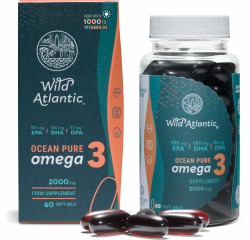Omega-3 deficiency is widespread.
According to the World Health Organisation, 1 in 4 people worldwide will be affected by Mental illness at some point in their lives. There is a link between Omega-3 deficiency and depression and anxiety, yet most of us are deficient in this essential fatty acid, due to low seafood intake, the overuse of corn and soybean oil in processed foods and the overconsumption of meat from grain-fed livestock.

For almost thirty years, experts have understood the link between mental illness and low-protein diets. However, some scientists (and doctors) are beginning to argue that Omega-3 fatty acids are the real culprit behind depression and anxiety. Recent studies show that an Omega-3 deficiency is likely to contribute to Bipolar Disorder. There is still much debate over this issue and whether it truly has a role in modern society.
Low levels of Omega-3 may lead to a greater risk of depression and anxiety
A new study completed by researchers from the University of Melbourne and Orygen, the National Centre of Excellence in Youth Mental Health, has found there is a positive relationship between fish oil (an omega-3 fatty acid) and depressive symptoms. The research, published by the JAMA Psychiatry journal, also examined data from six trials involving people of all ages who were already experiencing symptoms of depression or had a diagnosis of major depression, bipolar disorder or schizophrenia.
Closer-to-home research conducted by Professor R.J. Murray and her team at the University of Oxford, United Kingdom, suggests that Omega-3 deficiency is strongly linked to a higher risk of experiencing depression and anxiety.
People with low Omega-3 levels tend to have lower moods.

As well as having a positive impact on your joints, Omega-3 has also been shown to be beneficial for our minds. There have been numerous studies that have verified that Omega-3s can improve brain function, as well as reduce the risk of depression and anxiety. Researchers from Columbia University found that people with low Omega-3 levels tended to have lower moods – and further, that people with higher levels of Omega-3 fats in their blood had fewer signs of depression.
How do you know if you aren't getting enough Omega-3?
The short answer is you’re probably not getting enough Omega-3. It’s estimated that about 90% of Western populations suffer from an Omega-3 deficiency. This means there are 7.5 billion people out there living without the many benefits of a healthy supply of Omega-3. The good news is that you can fix this problem for free; eat more oily fish. But perhaps if you’re very deficient, you’ll need to take a test to know your levels and add a good quality natural fish oil supplement to your diet. Our simple, at-home test measures your Omega-3 levels and your Omega-3 to 6 ratio. Calculate how much Omega-3 you need to achieve an optimal Index using our Omega-3 Index Calculator.
You can improve your mood by making sure your dietary intake of Omega-3 is sufficient.
Eating more oily fish is an important step to increasing your level of Omega-3. For some who might not be fish lovers, you can also consider a high-quality Omega-3 supplement. Just 2 of our Omega-3 capsules contain as much EPA & DHA as 3 oz / 85g of Wild Atlantic Salmon (1,600mg).
Other articles about Omega-3

Why the wisdom of Fish Friday is good for your Omega-3 levels and your health.
We recently celebrated ‘Global Omega-3 Day’. It served as a reminder for us to sear up some salmon, eat those anchovies and take copious amounts

Why Omega-3s are crucial for pregnant moms
A new pregnancy should hopefully be a very happy and joyful time. Expecting a new life is a wonderful experience. However, some young mums may

Who Needs Omega 3 the Most?
Who Needs Omega-3 the Most? Omega-3 fatty acids are essential for maintaining good health. They play a crucial role in brain function, inflammation reduction, and






























